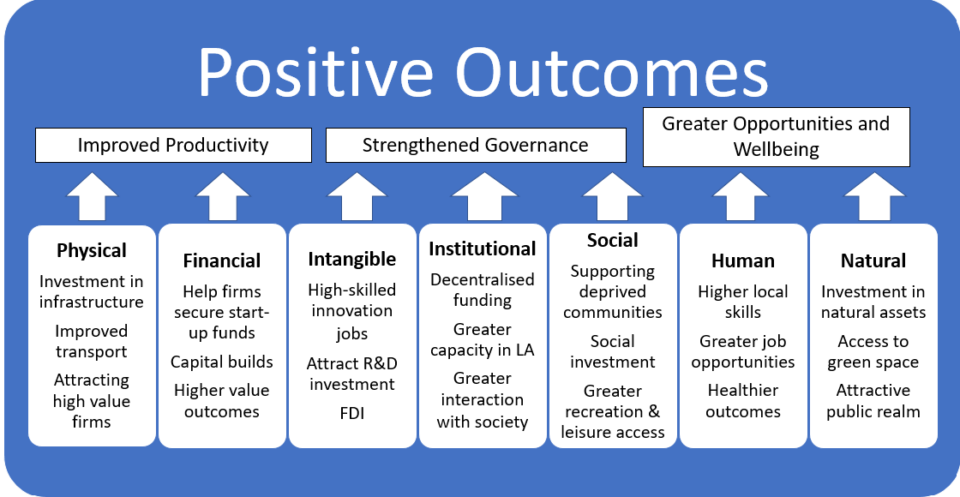How does the government’s focus on Levelling Up capitals translate to reality in Rochdale?
How does the government’s focus on Levelling Up translate to reality? A research project from The Productivity Institute is examining how the six capitals conceived to drive Levelling Up actually work, starting with Rochdale in Greater Manchester.
As part of the Investment in Places project, researchers from The Productivity Institute are examining how the capitals identified in the UK Government’s 2022 Levelling Up the United Kingdom white paper, are operationalised within towns and small cities across the UK.
The white paper’s broad objective was for policy makers to provide every citizen of the UK with the opportunity to flourish, meaning they lead longer and more fulfilling lives, and see sustained improvements in living standards and well-being.
It defines spatial inequalities largely in terms of different levels of resources or ‘capitals’ – physical, human, intangible, financial, social and institutional – with the ostensive objective to strengthen specific capitals in places where they are comparatively weak. . We add to this natural capital, the investment in which could support environmental conservation, access to green space, and contribute to net-zero targets by reducing CO2 emissions.
The Productivity Institute’s initial work in Rochdale has been assessing the strength and weaknesses of the capitals. Improvements in all capitals can contribute to a broad-based investment strategy and to achieve consistent improvements in places over the long term.
This means not just focusing on just skills or infrastructure, but thinking and acting strategically to build relationships across assets and resources that need to be created or rebuilt. A broad-based investment strategy is more likely to create positive cycles that will add value for people and place and raise productivity.
Focus on Rochdale
Rochdale borough in the north east of Greater Manchester has a population of 224,100. Once part of northern England’s textile trade, Rochdale was a successful product of the Industrial Revolution, but its economy began to decline in the middle of the 20th century, along with the UK’s textile industry. This was accompanied by firms who built the textile mills developing engineering strengths within the economy.
Rochdale’s productivity is falling behind in relation to the UK and its other North West neighbours, according to The Productivity Institute Lab’s regional scorecard. Examining why this is the case, and considering how this trend might be turned around is a key aim of the project.
Data was collected in Rochdale covering the measures which represent the capitals. Key players in Rochdale’s local economy took part in interviews and a workshop to get to the heart of how these capitals interact.
Rochdale has focused on improvements in medium-level technical skills that will feed into the creation of good, innovative jobs through a recent investment boost of government funding for the Greater Manchester Innovation Accelerator and Strength in Places Fund.
Two new training and research institutions have also been set up: the Centre for Expertise in Advanced Materials and Sustainability and the Advanced Machinery Productivity Institute. Connecting job opportunities with technical courses at the Further Education College has further helped in fore-sighting future jobs.
These investments will benefit from infrastructure improvements to realise the Atom Valley Mayor Development Zone by way of improvements in bus and tram routes as part of the Places for Everyone spatial plan. Atom Valley, covering Rochdale and the neighbouring towns of Bury and Oldham, is aimed at building a major UK innovation cluster. A public-private partnership was approved in 2022, and it has plans to build an advanced manufacturing hub and create 20,000 jobs.
A report on the work in Rochdale will be published this year.
Interested in your area taking part?
If your area is keen to take part in our research, please read our prospectus and contact us at tpi@manchester.ac.uk.




